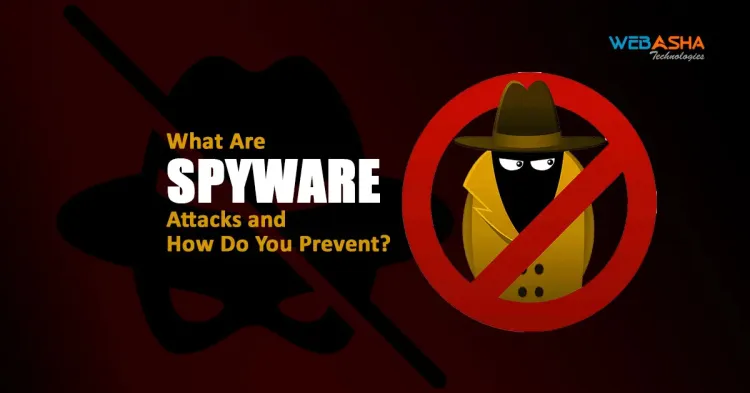What Are Spyware Attacks and How Do You Prevent?
Learn about spyware attacks and how to prevent them with our comprehensive guide. Understand the different types of spyware, how they work, and essential tips for protecting your personal data. Discover effective strategies for preventing spyware infections and safeguarding your privacy.

In today’s digital age, spyware attacks have become a significant threat to personal and organizational security. Spyware is malicious software designed to secretly monitor and collect information from a computer or mobile device without the user's consent. Understanding what spyware attacks are and how to prevent them is crucial for safeguarding your sensitive data and maintaining your privacy.
What Are Spyware Attacks?
Spyware attacks involve the installation of malicious software on a device with the intent to gather personal or sensitive information. Unlike other forms of malware, spyware operates covertly, often without the user’s knowledge, to track their activities and collect data. Here’s a closer look at what makes spyware attacks particularly dangerous:
Data Collection: Spyware can capture a wide range of information, including keystrokes, browsing history, email contents, login credentials, and personal details.
System Monitoring: Spyware can monitor your online activities, track your location, and even access your webcam and microphone, leading to serious privacy breaches.
Data Transmission: Collected data is often sent to remote servers controlled by cybercriminals, who can use it for identity theft, financial fraud, or espionage.
Types of Spyware
Keyloggers: Record every keystroke you make, capturing sensitive information such as passwords and credit card numbers.
Adware: Although primarily used to display unwanted ads, adware can also collect user data for targeted advertising.
Trojans: Disguised as legitimate software, trojans can secretly install spyware on your device when executed.
Tracking Cookies: Monitor your online behavior by storing data about your browsing habits and preferences.
Remote Access Trojans (RATs): Allow cybercriminals to remotely control your device and access all stored information.
How Do Spyware Attacks Work?
Spyware attacks typically begin with the infection of a device through various means:
Phishing Emails: Malicious attachments or links in phishing emails can install spyware when opened.
Malicious Websites: Visiting compromised or fake websites can trigger the download and installation of spyware.
Software Vulnerabilities: Exploiting unpatched software vulnerabilities can provide a gateway for spyware to enter your system.
Unverified Downloads: Downloading software or apps from untrusted sources can lead to inadvertent spyware installation.
How to Prevent Spyware Attacks
Install Reliable Security Software:
Use reputable antivirus and anti-spyware programs that offer real-time protection and regular updates to detect and block spyware.
Keep Your Software Updated:
Regularly update your operating system, browsers, and applications to patch known vulnerabilities that spyware can exploit.
Be Cautious with Email Attachments and Links:
Avoid opening email attachments or clicking on links from unknown or suspicious sources. Verify the authenticity of the sender before interacting with their content.
Download Software from Trusted Sources:
Only download software, apps, and plugins from official websites or reputable app stores to minimize the risk of encountering spyware.
Use Strong Passwords and Authentication:
Employ strong, unique passwords for your online accounts and enable multi-factor authentication to add an extra layer of security.
Monitor Your Device Activity:
Regularly check for unusual or unauthorized activities on your device, such as unexpected pop-ups, slow performance, or unfamiliar programs.
Educate Yourself and Others:
Stay informed about the latest cybersecurity threats and educate yourself and others about safe online practices to reduce the risk of spyware infections.
Utilize Browser Security Features:
Enable browser security settings and use privacy-focused extensions to block tracking cookies and prevent unauthorized data collection.
Backup Your Data:
Regularly backup important data to a secure location to minimize the impact of potential spyware attacks or data loss.
Conclusion
Spyware attacks pose a significant threat to personal and organizational security by secretly collecting sensitive information and monitoring activities. By understanding the nature of spyware and implementing robust preventive measures, you can protect your devices and data from these malicious threats. Staying vigilant, practicing safe online behaviors, and utilizing effective security tools are key to preventing spyware attacks and maintaining your privacy in the digital world.
Frequently Asked Questions
1. What is spyware?
Spyware is malicious software designed to secretly monitor and collect information from a computer or mobile device without the user’s consent. It can gather personal data, track online activities, and transmit this information to cybercriminals for various malicious purposes.
2. How does spyware infect a device?
Spyware can infect a device through various methods, including:
Phishing Emails: Malicious attachments or links in phishing emails can install spyware when opened.
Malicious Websites: Visiting compromised or malicious websites can trigger the download and installation of spyware.
Software Vulnerabilities: Exploiting unpatched software vulnerabilities can provide a gateway for spyware to enter your system.
Unverified Downloads: Downloading software or apps from untrusted sources can lead to inadvertent spyware installation.
3. What are common types of spyware?
Common types of spyware include:
Keyloggers: Record every keystroke to capture sensitive information like passwords and credit card numbers.
Adware: Displays unwanted ads and collects user data for targeted advertising.
Trojans: Disguise themselves as legitimate software and install spyware when executed.
Tracking Cookies: Monitor online behavior by storing data about browsing habits and preferences.
Remote Access Trojans (RATs): Allow cybercriminals to remotely control your device and access stored information.
4. What are the signs of a spyware infection?
Signs of a spyware infection may include:
Sluggish Performance: Slow computer or mobile device performance and decreased responsiveness.
Unexpected Pop-ups: Frequent pop-ups or ads, especially those that seem unrelated to your recent activities.
Unusual Network Activity: High network activity or data usage that you can't account for.
Unauthorized Changes: Changes in system settings or configurations that you didn’t make.
5. How can I prevent spyware infections?
To prevent spyware infections:
Install Reliable Security Software: Use reputable antivirus and anti-spyware programs with real-time protection and regular updates.
Keep Software Updated: Regularly update your operating system, browsers, and applications to patch vulnerabilities.
Be Cautious with Emails and Links: Avoid opening attachments or clicking on links from unknown or suspicious sources.
Download from Trusted Sources: Only download software from official websites or reputable app stores.
Use Strong Passwords: Employ strong, unique passwords and enable multi-factor authentication.
6. What should I do if I suspect a spyware infection?
If you suspect a spyware infection:
Run a Scan: Use your security software to perform a full system scan and remove any detected spyware.
Update Security Software: Ensure that your antivirus and anti-spyware programs are up-to-date.
Change Passwords: Change passwords for sensitive accounts, especially if you suspect they may have been compromised.
Seek Professional Help: If the problem persists or you’re unsure how to proceed, consider consulting a cybersecurity professional.
7. Can spyware be removed completely?
Yes, spyware can usually be removed with the right tools. Running a comprehensive scan with reputable anti-spyware software can detect and eliminate most spyware. However, in severe cases, additional steps like restoring your system from a backup or performing a clean reinstall of your operating system may be necessary.
8. How does spyware affect businesses?
For businesses, spyware can lead to:
Data Breaches: Unauthorized access to sensitive company information and client data.
Financial Losses: Costs associated with data recovery, system cleanup, and legal compliance.
Reputational Damage: Loss of customer trust and damage to the company's reputation.
Operational Disruptions: Interference with normal business operations and decreased productivity.
9. Are there any legal implications of spyware?
Yes, using or distributing spyware is illegal in many jurisdictions. Individuals or organizations caught engaging in such activities can face legal consequences, including fines and imprisonment. Additionally, organizations that fail to protect sensitive data may be subject to regulatory penalties.
10. How can I stay informed about spyware threats?
To stay informed about spyware threats:
Follow Cybersecurity News: Keep up with the latest news and updates on cybersecurity threats and best practices.
Join Professional Communities: Engage with cybersecurity forums and communities to share knowledge and learn from other professionals.
Participate in Training: Consider attending workshops, webinars, or training sessions focused on cybersecurity and spyware prevention.












![Top 10 Ethical Hackers in the World [2025]](https://www.webasha.com/blog/uploads/images/202408/image_100x75_66c2f983c207b.webp)



![[2025] Top 100+ VAPT Interview Questions and Answers](https://www.webasha.com/blog/uploads/images/image_100x75_6512b1e4b64f7.jpg)







